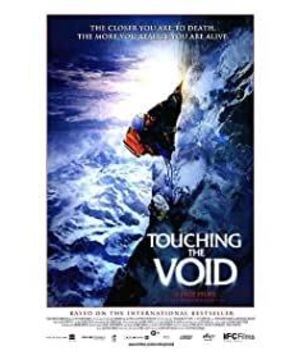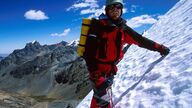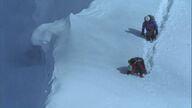This is a question that has been entangled in my heart throughout the entire viewing process. It seems a bit off the beaten track, but I have to say, it's definitely a good question to ponder.
At the beginning, a lot of words were used to pave the way for the importance of trust in teammates during teamwork. Sure enough, the problem appeared here. After being brainwashed by the director's various film languages, the melody that has been circling in my mind for a long time is: this is a film about cooperation and trust.
The story goes like this: Simon and joe made it to the top of the Peruvian Andes. In addition to joy, tragedy happened on the way down the mountain. Joe broke his leg, and Simon used a rope to connect the two to continue down the mountain. However, the outdoors is very dangerous, and poor Joy made it worse. His broken leg fell into a deep crevice in the ice. Simon failed to find someone, so he cut off the rope and went down the mountain alone. After that, Joe rolled and climbed alone for a few days. After excluding all kinds of hardships and creating the miracle of the limit of human existence, he finally climbed back to the camp and was rescued.
There is not much to say about the plot. The documentary itself, the degree of thrill and excitement, coupled with the beautiful landscape photography, believe that people in front of the screen can feast their eyes. However, regarding the details, as a semi-senior outdoor enthusiast, I can't help but have some doubts.
First, why does Joe have to carry a large bag when he is in the extreme state, and the first step is to reduce the weight and maintain physical strength. The director completely ignored this point.
Second, the section that crosses the rocky river channel gives a long and close-up representation. While the audience lamented the difficulty of Joe's survival, I wonder if anyone had any questions, why did they choose to stand and jump
forward ? Can't we use the rolling method? Such a sharp and hard rock, if you fall like that, are you not afraid of more fractures and injuries? I really can't figure out if the director wanted to accentuate the tough effects or if Joe really jumped out like that.
Regarding these details, after all, it is a person who has created miracles, and it may be possible, so I don't bother much. Back to the filming itself.
As mentioned just now, the director's clear direction at the beginning is the issue of trust, but in the film, although there is trust throughout, Joe's survival nature and the objective shooting of overcoming difficulties dominate.
Including the ending, Simon heard Joy's cry and stepped forward to rescue him. Although it was done in the dark, his facial expressions were much inferior to the facial expressions when Joy just broke his leg. There is basically no close-up to emphasize.
I believe that Simon's heart at that time should be very complicated, with self-blame, surprise, etc. in addition to excitement, and the director basically did not grasp it and describe it in depth. This, for the sublimation of the theme of trust at the beginning, is really regrettable.
Also, I think the portrayal of Joe's inner fluctuations, such as setting a 20-minute goal, etc., is too sloppy. Just relying on the background voice to explain his excitement for completing the task is obviously not penetrating and shocking enough. More close-up shots of expressions may impress me more.
Compared with the momentum at the beginning, the baggage at the end makes me feel very empty. I don't know whether to focus on the topic of trust, or the thrill of survival. It was originally an open ending to think about the right or wrong of simon's departure from joe, but it was just a cursory mention. When JOE met Simon again, the first answer had already said, "If I were you, I would leave." Although the documentary should not have too many subjective colors of the director, I insist that the director should at least give some close-ups to Simon and Joe from this angle, and at least guide the audience to think about this issue. Because the first sentence after the desperate situation is an exposition of the issue of trust in human nature, so, whether Joe's sentence is to forgive Simon, or to emphasize that I really care about you leaving me, this is actually a very important Interesting angle.
All in all, the feature of documentaries is reality, but how to make the audience's vision and mind get more impact in reality, and then trigger a lot of thinking, is the meaning of shooting documentaries. This film, in addition to the shocking surprises brought by the plot, is far from enough in filming. In view of the scenery itself and the difficulty of shooting, I still gave it four stars, after all, the shooting of the ice and snow itself is worthy of admiration.
Facing the extreme scenery, being in a state of danger, the desire to survive, coupled with a strong heart and trusting thinking, I would like to ask, joy, in your 168 hours, have you seen the snow-capped mountains still beautiful?
View more about Touching the Void reviews









